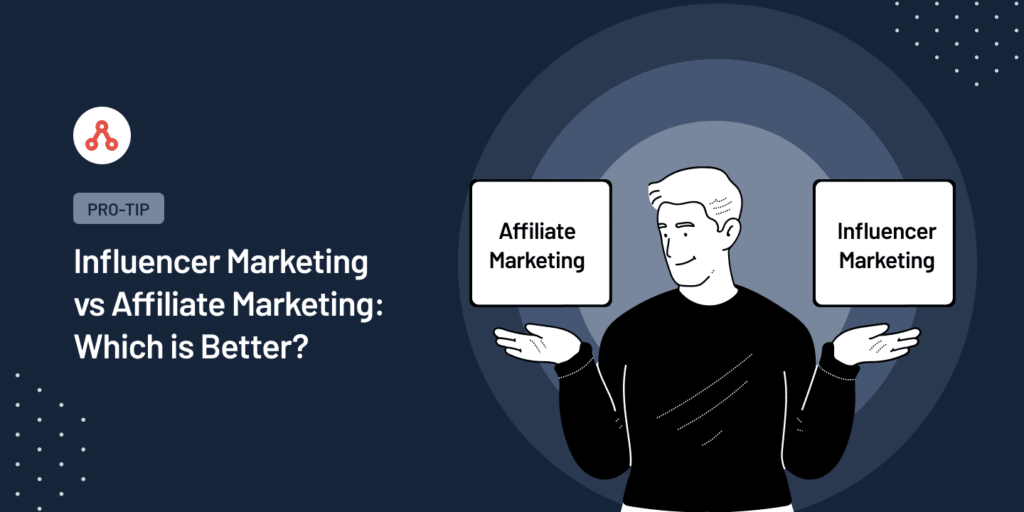Affiliate Marketing Vs Influencer Marketing: Which is More Effective?
Affiliate marketing and influencer marketing are not the same thing. While affiliate marketing relies on leveraging an audience to promote products or services, influencer marketing involves working with influential individuals to endorse a brand.
Pros And Cons
In the world of digital marketing, two popular strategies that are often compared and debated are affiliate marketing and influencer marketing. Both can be highly effective in driving conversions and increasing brand awareness, but they come with their own set of pros and cons. In this section, we will explore the advantages and disadvantages of both affiliate marketing and influencer marketing, helping you make an informed decision about which approach is best for your business.
Pros Of Affiliate Marketing
Affiliate marketing offers several benefits that make it a popular choice for brands looking to expand their reach and drive sales. Here are some of the key pros:
▶▶ Read more : 5 Types of Content Marketing: A Comprehensive Guide
- Increased exposure: Affiliate marketing allows you to tap into the audience of other influencers or businesses, giving you access to a wider pool of potential customers.
- Cost-effective: With affiliate marketing, you only pay a commission when a sale is made, making it a cost-effective strategy compared to other forms of marketing.
- Trackable performance: Affiliate marketing comes with trackable links unique to each affiliate, allowing you to measure the effectiveness of your campaigns and make data-driven decisions.
- Build brand advocates: By working with affiliates who are genuinely interested in your brand, you can build long-lasting relationships and create brand advocates who will continue promoting your products even after the initial campaign.
Cons Of Affiliate Marketing
While affiliate marketing has its advantages, it also has a few drawbacks that are important to consider. Here are some of the cons:
- Lack of control: As an affiliate marketer, you rely on the efforts of others to promote your products. This lack of control over the messaging and tactics used by affiliates can sometimes lead to brand image dilution or misrepresentation.
- Saturation of the market: With the rise in popularity of affiliate marketing, many niches have become oversaturated with affiliates promoting similar products. This can make it challenging to stand out and capture the attention of your target audience.
- Dependency on affiliates: Your affiliate marketing success heavily relies on the efforts and strategies of your affiliates. If they decide to discontinue or reduce their promotion, it can negatively impact your sales.
Pros Of Influencer Marketing
Influencer marketing is another powerful strategy that has gained significant traction in recent years. Here are some of the pros of influencer marketing:
- Authenticity: Influencers have built trust and credibility with their audience, making their recommendations and endorsements more genuine. This can result in higher conversion rates and a stronger brand connection.
- Targeted reach: By carefully selecting influencers who align with your brand and target audience, you can ensure that your message reaches the right people, increasing the likelihood of conversions.
- Content creation: Influencers are skilled content creators who can produce engaging, original content to promote your products or services. This can help showcase your brand in a unique and compelling way.
- Long-term partnerships: Building long-term relationships with influencers can lead to recurring endorsements and ongoing promotion, providing sustained exposure for your brand.
▶▶ Read more : Top 10 Benefits of Influencer Marketing
Cons Of Influencer Marketing
While influencer marketing has its advantages, there are also some potential downsides to consider. Here are a few cons:
- High cost: In the world of influencer marketing, popular influencers often come with a hefty price tag. This can make it challenging for smaller businesses with limited budgets to afford collaborations with top-tier influencers.
- Limited control: Influencers have their own personal brand and style, which may not always align perfectly with your brand image. It's important to carefully select influencers whose values and aesthetic match yours to avoid any potential conflicts.
- Fickle audiences: The loyalty of an influencer's audience is not guaranteed. As trends and preferences change, the audience's interest in a particular influencer may wane, affecting the effectiveness of your campaigns.
Both affiliate marketing and influencer marketing have their strengths and weaknesses. It's crucial to evaluate these pros and cons in the context of your business goals, target audience, and available resources to determine which strategy will provide the best return on investment.

Credit: affiliatewp.com
▶▶ Read more : Top 10 Real Estate Social Media Marketing Companies in 2024
Effectiveness
Both affiliate marketing and influencer marketing have their own effectiveness in driving traffic and increasing sales. Affiliate marketing allows brands to leverage the audience of other brands, partners, and influencers, while influencer marketing helps build direct connections and interactions with potential customers.
The choice between the two ultimately depends on the brand's goals and preferences.
Measuring Effectiveness Of Affiliate Marketing:
Measuring the effectiveness of affiliate marketing is crucial for businesses to evaluate its impact and optimize their campaigns. There are several key metrics that can be used to gauge the effectiveness of affiliate marketing:
- Conversion Rate: This metric measures the percentage of visitors who complete a desired action, such as making a purchase or filling out a form. A higher conversion rate indicates a more effective affiliate marketing campaign.
- Revenue Generated: Tracking the revenue generated from affiliate marketing efforts is essential to determine the ROI. This metric provides a clear picture of how much sales and revenue can be attributed to affiliate marketing.
- Click-through Rate (CTR): The CTR measures the percentage of people who click on an affiliate link compared to the total number of impressions. A higher CTR indicates that the affiliate marketing content is compelling and engaging.
- Customer Lifetime Value (CLV): CLV represents the total value a customer brings to a business over their entire relationship. Tracking the CLV of customers acquired through affiliate marketing helps determine the long-term effectiveness of the campaign.
- Cost per Acquisition (CPA): CPA measures the cost incurred to acquire a new customer through affiliate marketing. Monitoring the CPA helps businesses understand whether their affiliate marketing efforts are cost-effective.
▶▶ Read more : Top 10 Content Marketing Strategy Examples 2024
By closely monitoring these metrics, businesses can continuously refine their affiliate marketing strategies, enhance campaign effectiveness, and maximize their ROI.
Measuring Effectiveness Of Influencer Marketing:
Measuring the effectiveness of influencer marketing is essential to evaluate the impact of collaborations and optimize future campaigns. Here are some key metrics to measure the effectiveness of influencer marketing:
- Engagement Rate: The engagement rate measures the level of interaction and involvement with influencer-generated content. Likes, comments, and shares indicate a high level of engagement, demonstrating the effectiveness of the influencer's promotion.
- Reach and Impressions: The reach metric calculates the number of unique individuals who have been exposed to the influencer's content. Impressions, on the other hand, measure the total number of times content has been displayed. Higher reach and impressions indicate a wider audience reached.
- Conversion Rate: Tracking the percentage of followers who take the desired action, such as making a purchase or signing up for a newsletter, helps evaluate the effectiveness of influencer marketing in driving conversions.
- Brand Sentiment: Monitoring the sentiment around the brand after an influencer campaign can provide insights into how effectively the influencer has communicated the brand's message and impacted audience perception.
- Return on Investment (ROI): Calculating the ROI of influencer marketing efforts involves comparing the revenue generated from the campaign with the investment made. This metric helps businesses determine the overall effectiveness and profitability of influencer partnerships.
Comparison Of Effectiveness:
When it comes to measuring effectiveness, both affiliate marketing and influencer marketing offer valuable insights. However, they differ in terms of tracking and attribution. Affiliate marketing provides a more direct and trackable approach to measuring effectiveness through the use of unique affiliate links.
▶▶ Read more : How to Start Social Media Marketing As a Beginner: Master the Basics!
By having unique affiliate links for each affiliate, businesses can precisely track the number of clicks, conversions, and sales generated by each affiliate. This level of tracking allows businesses to evaluate the performance of individual affiliates and optimize their campaigns accordingly. The clear visibility into conversions and revenue generated makes it easier to measure the ROI of affiliate marketing efforts.
In contrast, influencer marketing is often more challenging to measure accurately. While engagement metrics, reach, and impressions provide valuable insights, they do not provide a direct correlation to sales and revenue. Attributing conversions to a specific influencer can be more difficult, especially when multiple influencers are involved in a campaign.
However, by utilizing trackable links or exclusive discount codes, businesses can gather data to measure the effectiveness of influencer marketing to some extent. Additionally, monitoring brand sentiment and conducting customer surveys can provide further insights into the impact of influencer collaborations.
Ultimately, both affiliate marketing and influencer marketing have their own strengths when it comes to measuring effectiveness. Businesses should consider their specific goals, target audience, and resources to determine which approach aligns best with their overall marketing strategy.

Credit: www.sellbrite.com
Frequently Asked Questions For Affiliate Marketing Vs Influencer Marketing
1.Do You Have To Be An Influencer To Do Affiliate Marketing?
Ans: No, you don't have to be an influencer to do affiliate marketing. However, having an audience is important to leverage for affiliate marketing. You can start building your audience by purchasing affiliate marketing services from other brands, partners, and influencers.
2.Which Is Better Affiliate Marketing Or Social Media Marketing?
Ans: Affiliate marketing and social media marketing serve different purposes. Affiliate marketing is better for those seeking passive income, while social media marketing is ideal for those who enjoy client interactions and building a business. The choice depends on personal strengths and objectives.
Note: The answer has been provided based on the given guidelines and within the word limit.
▶▶ Read more : How to Create a Marketing Funnel: A Step-by-Step Guide
3.How Much Do Influencers Get Paid For Affiliate Marketing?
Ans: Influencers can get paid varying amounts for affiliate marketing, depending on factors such as their audience size and engagement rates. Payments can range from a few dollars per click or lead, to hundreds or even thousands of dollars for successful conversions.
4.Is It Better To Be A Brand Ambassador Or An Affiliate?
Ans: Being a brand ambassador is better because they have a deep understanding and love for the brand, while affiliates promote based on commission potential.
Conclusion
Both affiliate marketing and influencer marketing have their own unique advantages and can be effective strategies for promoting products and driving sales. Affiliate marketing allows for more independence and passive income, while influencer marketing focuses on building relationships and engaging with an audience.
Ultimately, the choice between the two depends on your personal strengths and objectives. Remember, success in marketing comes from finding the right approach that resonates with your target audience and aligns with your business goals.





.webp)

ফিউচার ড্রীম আইটির নীতিমালা মেনে কমেন্ট করুন। প্রতিটি কমেন্ট রিভিউ করা হয়।
comment url